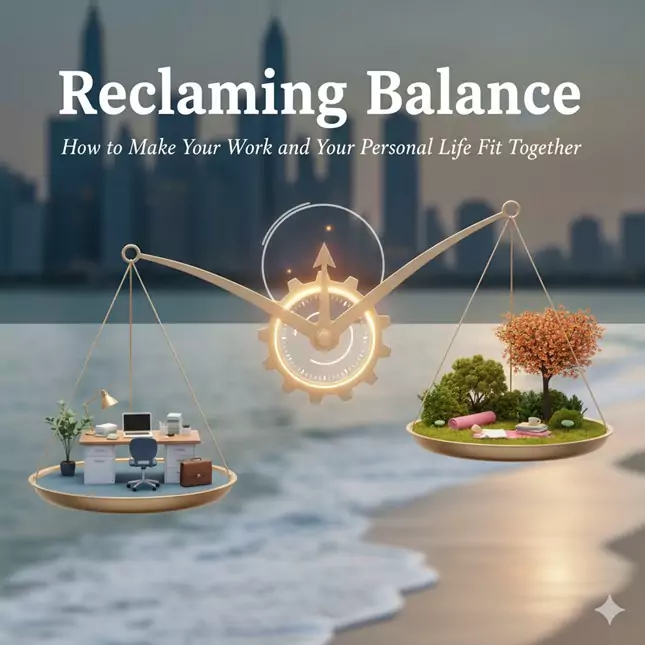Guest Post By Jennifer McGregor https://publichealthlibary.org
Modern life is a cocktail of ambition, deadlines, and unpaid tabs on your time. Reclaiming Balance is not an easy task anymore. You wake up already behind, trying to finish tasks you didn’t choose before starting the ones you did. Somewhere between commute-induced fatigue and the guilt of missed moments, you might pause long enough to ask: Is this how it’s supposed to feel? Work-life balance isn’t a luxury it’s a quiet rebellion against burnout.
But more than that, it’s a recalibration of how we live, work, and decide what matters. The idea isn’t new, but in an era of blurred lines and overclocked schedules, it’s never felt more urgent. This isn’t about chasing perfection. It’s about finding rhythm in a world that rarely gives you room to breathe.
Why Balance Still Matters.
Work-life balance matters because it shapes more than mood it affects opportunity. When employers genuinely prioritize balance, they don’t just get happier teams. However they build more inclusive environments. Research suggests that flexible work policies directly impact not just retention but also why balance improves organizational diversity.
People with caregiving responsibilities, health limitations, or differing cultural norms about time are far more likely to thrive when the system isn’t rigid. Balance becomes a signal that people matter and when that signal is clear, performance tends to follow. So, while balance is often framed as a personal pursuit, it’s also a strategic one. It reshapes who shows up and who stays.
Ready to let go? Reclaim your balance and make a fresh start by booking a chakra cleansing session today. Release the invisible weight you’ve been carrying and step into a lighter, more centered you. Get It Here ..
When Education becomes a Life Tool.
If you’re thinking that adding school to an already packed schedule sounds like the opposite of balance, you’re not alone. But when designed with flexibility in mind, some online degree programs become lifelines.
They let people re-skill or level up without pressing pause on everything else. The shift isn’t just academic it’s deeply personal. It proves you can grow without burning out. If that’s your path, check this out: programs that offer asynchronous coursework and self-paced modules are changing what’s possible for working adults.
Reframe the Idea of Balance. How do you Reclaim your Work Life Balance?
The term work-life harmony has emerged in recent years as a more forgiving, flexible idea one that invites fluctuation. Rather than pursuing a tightrope act, individuals are beginning to embrace embracing ebb-and-flow harmony.
Some weeks work needs more, other times, life wins. The difference is intentionality. Harmony accepts that priorities shift and that success doesn’t mean perfect distribution it means congruence. When your time reflects your values, even imbalance can feel right. The goal is no longer to keep the scales level it’s to know why they’re tipping.
Reclaim Your Balance. How Balance Pays Off (Literally)?
The measurable effects of better work-life alignment are hard to ignore. People who feel in control of their time report fewer errors, better collaboration, and longer tenure. It’s not just about less stress. It’s about more clarity, better decision-making, and fewer mistakes.
One analysis found balance tied to well-being and productivity, especially in high-stress sectors. People who are rested, respected, and trusted to manage their time tend to show up sharper. And when the workplace culture reinforces that, productivity isn’t just higher it’s more sustainable.

When Policies Reflect Real Life
Companies that develop thoughtful, transparent frameworks for remote work, flex-time, and PTO often see supportive policies boosting engagement. It’s not about offering unlimited vacation as a PR stunt. It’s about treating autonomy as a real resource. When people believe they can take a break, they do and they come back more focused.
These policies also give permission for people to work in ways that reflect their real lives, not some corporate ideal. The difference between saying “we care” and proving it is often just one policy away.
Benefits of the Four-Day-Week
In Scotland and other regions, government-backed pilots have found the four‑day week improving mental health while keeping output steady or even improving it. The key isn’t just fewer hours it’s smarter, tighter focus during the time that remains.
When companies stop equating hours with loyalty, they often find they’ve been mismeasuring commitment all along. And for workers, the benefits extend beyond productivity:
Time to think, care, rest, or simply be a person again. These kinds of structural experiments may not be the norm yet, but they hint at what’s possible when we loosen the grip of tradition.
Reclaiming Your Balance. Designing Work from the Inside Out.
One recent study examined how workers in high-stress sectors improved long-term satisfaction by balancing demands across life domains rather than trying to keep all plates spinning. It’s not about getting permission. It’s about shifting tasks, reframing effort, and negotiating expectations in small but meaningful ways.
Over time, those tweaks can become a new normal one where work feels more like something you do, not something that owns you. The act of crafting your job from within isn’t rebellion it’s reclaiming. A reshuffling of energies so they stop leaking out in all the wrong places.
In the end, balance isn’t a destination. It’s a posture, a practice, a quiet refusal to let the most important parts of your life become the leftovers. You won’t always get it right. Some weeks will collapse under the weight of deadlines and sick days and last-minute Zoom calls. But if you’ve built even a few anchors flexibility, boundaries, self-trust you’ll return to center faster. That’s the real win. Not perfection, but recovery. Not control, but clarity. Not balance as an aesthetic, but balance as a tool something to reach for, reshape, and reclaim.


